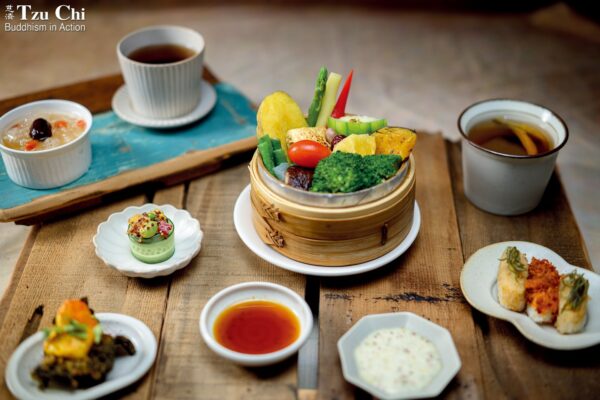By Khusnul Khotimah and Huang Xiao-qian
Photos by Arimami Suryo Asmoro
Alis Susilowati runs a small grocery store in Jakarta, Indonesia. Eking out a living isn’t easy for him, especially during the pandemic. Even so, he is happy with what he has been blessed with, such as his good health, which allows him to look after his physically and mentally disabled son.
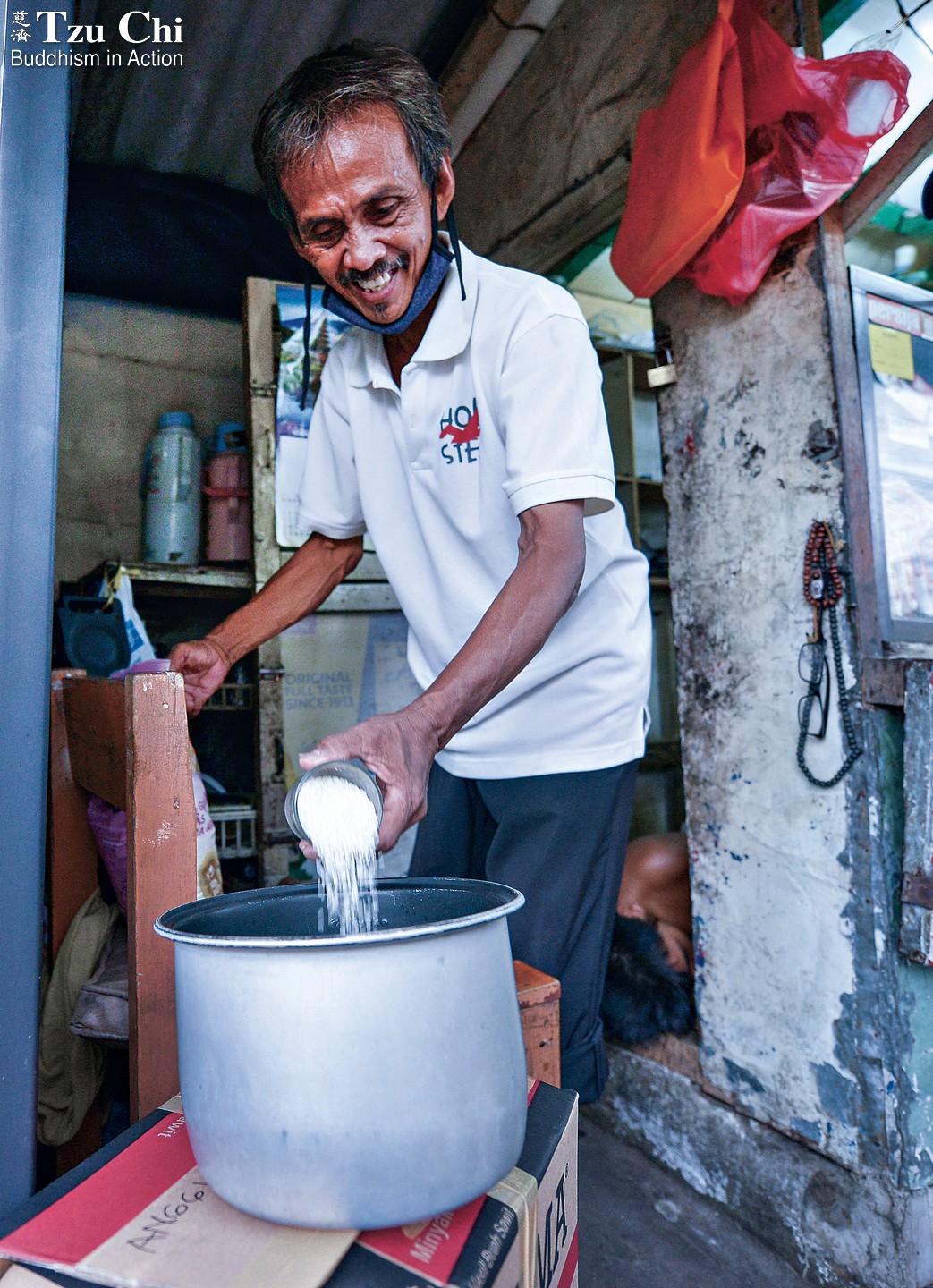
Alis Susilowati puts some rice into a cooker to cook. Rice was among the food items he received from Tzu Chi on this day.
At 65 years old, Alis Susilowati is no longer young. Though he’s at an age when most people start to take it easy, he has no such luxury. He can’t even afford to rent a decent house on his meager income. He and his two sons live in a small shed of about six square meters (65 square feet) on Pahlawan Revolusi Street in Jakarta, Indonesia.
His shed, located under a large tree, was built against the wall of a school. School administrators were kind enough to allow him to set up the shed and operate his business there, and even allow him to use the school’s electricity and shower facilities. The shed serves as a grocery store during the day and transforms into a bedroom for him and his two sons at night.
Though the store is extremely small, it’s been around a long time—37 years. Alis sells only a small variety of goods, such as mineral water, snacks, instant noodles, soap, and toothpaste. He doesn’t have the money to invest in a greater variety of sundries. After subtracting his overhead, he usually nets a profit of just 10,000 to 15,000 rupiah (US$0.68 to 1.02) a day.
“This is my bed,” Alis said to a small group of Tzu Chi volunteers, pointing to a long bench set in front of his store. Sporting a toothy smile, he told the volunteers that he moves the bench inside at night and sleeps on it. Though the roof shelters him from the elements, nothing can protect him from the mice that sometimes crawl across his body when he sleeps. “They probably think there is food in my stomach,” he said with good humor. Even though he sleeps on a bench with mice scampering around, he sleeps very well.
A poor financial situation isn’t the only challenge facing Alis. His older son is mentally and physically challenged, and caring for him takes extra effort. He’s been the principal caregiver for his son since his wife passed away three years ago. His other son, only educated through junior high, works in a furniture shop. When the volunteers visited Alis in May, that son had not worked in about two months. He was on an unpaid leave due to the pandemic.
Alis became a Tzu Chi care recipient six years ago, after learning through a friend that he could apply for aid from the foundation. Volunteers visited him in person after receiving his application, and soon thereafter added him to the foundation’s long-term aid list. He’s been receiving monthly financial support from Tzu Chi ever since.
Anastasia is a Tzu Chi volunteer who has cared for Alis for some time. She admires his attitude towards life. “He is grateful for what he has,” the volunteer said. “He thanks the school for allowing him to set up a grocery store next to the school. He’s never asked for more money from us. On the contrary, it is us who have been hoping to help him get more aid.”
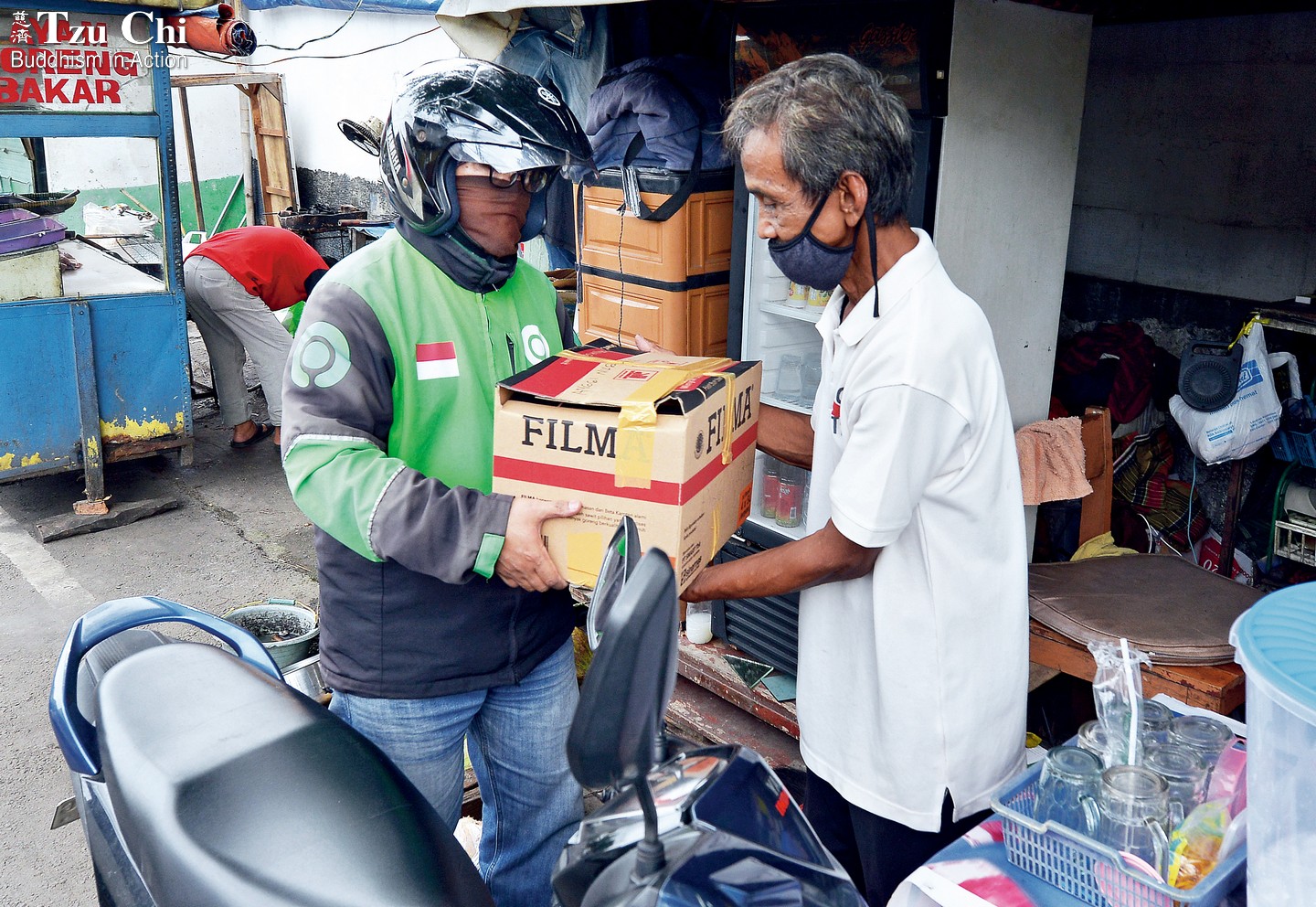
A motorcycle taxi driver delivers a box of daily necessities to Alis.
Gifts from Tzu Chi
Alis is Muslim and observes the holy month of Ramadan each year. Observers of Islam fast from sunrise to sunset during Ramadan, which began this year on April 24. That’s the day Alis started selling coconut water in front of his store. On May 6, half an hour before it was time to break the fast that day, a motorcycle taxi driver pulled up outside Alis’s store.
“Are you Mr. Alis?” the driver asked.
“Yes, sir,” Alis replied, leaning forward a little.
The driver untied a cardboard box from his motorcycle. Handing it over to Alis, he explained: “I’ve been asked by Tzu Chi Indonesia to deliver some daily necessities to you.”
“Thank Allah, and thank you, sir,” Alis said.
Alis immediately set about opening the delivery. Inside were five kilos (11 pounds) of rice, one kilo (2.2 pounds) of sugar, one liter (0.26 gallons) of cooking oil, biscuits, instant noodles, and five face masks. Many people were struggling financially due to the pandemic, Alis included, so the box of necessities was a precious gift.
“Thank our good Lord, Allah,” Alis muttered. He started going through the items one by one. He decided to sell the instant noodles for some extra income. Then he went to put some of the rice he had received in a cooker to cook for dinner. He typically cooks rice for a meal, then goes across the street to buy some other food to go with the rice.
Not long after Alis received the food items, Tzu Chi volunteers visited him at his store. They asked him how business had been doing lately. “I sold only three cups of drinks and three coconuts yesterday,” Alis said. “Since Ramadan started, I’ve only been making about 50,000 rupiah [US$3.39] a day. There’s been no profit to speak of.”
Volunteer Johan Kohar took out an envelope and handed it to Alis. It contained some cash aid. “Thank you so much,” Alis said. He said he’d use the money to pay for his and his family’s three meals. “The only thing I can do is pray for your health and the prosperity of Tzu Chi, so that you can continue to help people like us.”
The volunteers finally saw two people coming to patronize Alis’s shop. Dusk was gathering. Alis would soon be able to eat. He prepared a glass of coconut water and a plate of rice, which he’d eat along with the omelets the volunteers had brought him.
A few minutes later, the sounds of drums beating filled the air, calling for the Maghrib (sunset) prayer to begin. It also signaled that it was time to break the fast. Alis took a sip of his coconut water, his eyes sparkling with gratitude and contentment.
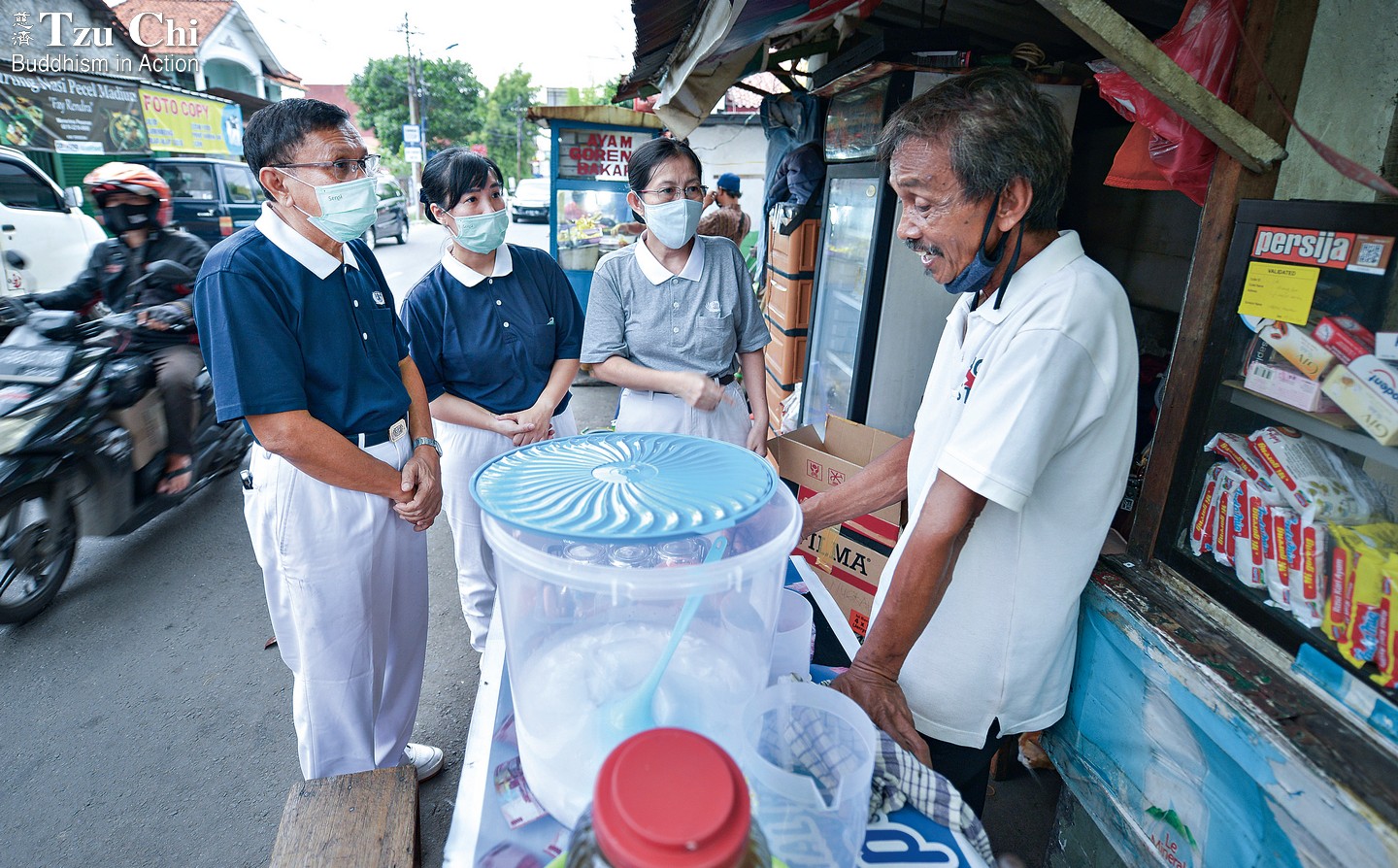
Tzu Chi volunteers visit Alis at his store. Alis became a Tzu Chi care recipient six years ago.
Tzu Chi Indonesia Responds to the Pandemic
Indonesia recorded zero coronavirus cases in January and February, despite its close links to China and despite being surrounded by infected countries, such as Singapore and Malaysia. Flights from nations with high infection rates also continued to fly into Indonesia. Health experts voiced their concerns, saying that there could be undetected infections in Indonesia. They recommended that the nation strengthen its detection systems.
Indonesia confirmed its first two infections on March 2, after a dance instructor and her mother tested positive for the disease. By the end of March, more than 1,500 cases had been confirmed. In April, the government started imposing large-scale social restrictions—Pembatasan Sosial Berskala Besar or PSBB—in four provinces and 25 cities/regencies in the nation. This partial lockdown was gradually lifted in the first weeks of June. Business activities could restart, and people were permitted to pray in a mosque. Schools, however, remained closed.
Indonesia has a population of 267 million, of which 25 million live below the poverty line. The pandemic has made the lives of the underserved even harder. To help out, Tzu Chi Indonesia has been working with the military, police, and local governments to distribute food to the underserved. Volunteers said that they can extend timely aid to more areas and more needy people by working with the governments. By the end of July, 379,300 boxes of food had been distributed in the nation. Tzu Chi Indonesia had also donated personal protective equipment and other medical equipment and supplies to over 1,300 medical facilities and other organizations in the country. The number of confirmed cases in the nation had surpassed 111,000 by early August. Volunteers will continue helping the needy through the pandemic.
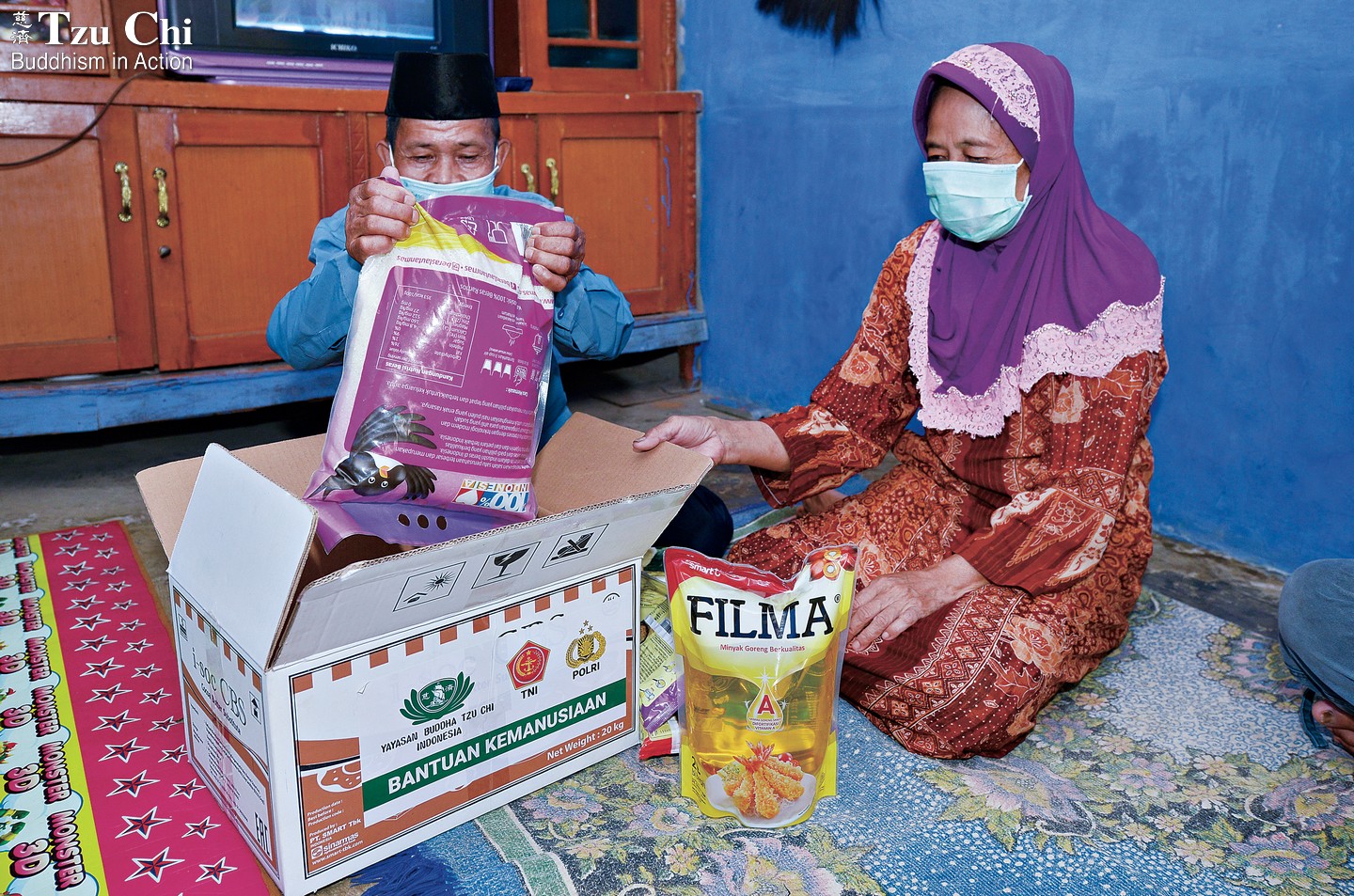
Nedih (left) and his wife, Titi, cheerfully examine items from Tzu Chi. The couple grows cassava, pineapple, and taro on rented lands and sells their crops in a market. Due to restrictions imposed during the pandemic, business was slow and their incomes saw a sharp decline.



